Submitted by Daniel Lazare via The Strategic Culture Foundation,
Last week as Donald Trump was preparing to take office, The New York Times — reeling from Trump’s interview in which he said he didn’t “really care” if the European Union holds together and described NATO as “obsolete” — declared that “the big winner” of the change in U.S. presidents was Vladimir Putin.
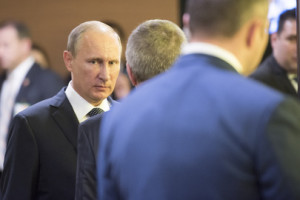
Russian President Vladimir Putin, following his address to the UN General Assembly on Sept. 28, 2015. (UN Photo)
Why? Because Putin “has been working assiduously not just to delegitimize American democracy by interfering with the election but to destabilize Europe and weaken if not destroy NATO, which he blames for the Soviet Union’s collapse.” And based on what Trump has been saying about the alliance and the E.U., it appears that, as of noon on Friday, Putin has a co-thinker in the White House.
The Times may be right about Putin coming out on top, but its bill of indictment against him is over the top. The Russian president is not working to delegitimize America democracy – the U.S. is doing the job just fine on its own – and he’s not destabilizing Europe either since the forces undermining the E.U. are essentially generated by the West (traceable to the austerity medicine administered after the 2008 financial collapse and to the refugee flows created by the U.S.-led invasions of Afghanistan, Iraq and Libya and the “regime change” project in Syria, none of which were initiated by Putin).
But the Times is entirely correct in pointing out that Putin is now riding high. He has a friend in Washington, he’s calling the shots in the Middle East, and it looks like he’ll soon be in a position to hammer out a rapprochement with Europe. So the big question facing the world is: how did he do it?
The answer is not by blackmailing Trump, hacking the Democratic National Committee, or any other such nonsense put out by disappointed Clintonites. Rather, Putin prevailed through a combination of skill and luck. He played his cards well. But he also had the good fortune of having an opponent who played his own hand extremely poorly. Russia won because America lost.
Years from now, as historians gather to discuss the great U.S. foreign-policy debacles of the early Twenty-first Century, they’ll have much to debate – the role of oil, Zionism and Islam; the destabilizing effects of the 2008 financial meltdown; and so forth. But one thing they’ll agree on will be the impact of hubris.
The U.S. emerged after the fall of the Berlin Wall as history’s first “hyperpower,” a country whose military strength dwarfed that of the rest of the world combined. It celebrated by engaging in a series of jolly little wars in Panama, the Balkans, and the Persian Gulf that seemed to confirm its invincibility. But then it made the mistake of invading Afghanistan and Iraq and found itself in serious trouble.
What Went Wrong?
Historians of the future will also no doubt agree that Obama might have averted catastrophe if he had decisively broken with Washington’s pro-war foreign-policy establishment. Plainly, a change of course was urgent if catastrophe was to be avoided. But the more realistic among them will note that any such correction would have been both difficult and disruptive. It would have meant abandoning some allies and hammering out new relationships with others, changes that would have elicited howls of protest from Washington to Riyadh.
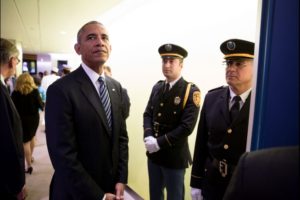
President Barack Obama waits backstage before making his last address at the United Nations General Assembly in New York, Sept. 20, 2016. (Official White House Photo by Pete Souza)
So Obama, an ardent compromiser by nature, decided to fine-tune the existing policy instead by shifting from the direct military intervention of the George W. Bush era to more indirect means. This was an understandable reaction to the excesses of the previous administration, but it only made matters worse.
Exhibit A is Syria, the great bleeding wound in the side of the Middle East. After calling on Bashar al-Assad to step down in August 2011, Obama could conceivably have followed up by sending in hundreds of thousands of U.S. troops to throw out the Baathists and install a pro-American regime in their place. None of Washington’s allies would have objected.
But since any such adventure was unthinkable in the wake of Afghanistan and Iraq, he opted for something more oblique. He ordered the CIA to begin working in secret to support the anti-Assad forces and sent Secretary of State Hillary Clinton to persuade such “Friends of Syria” as Saudi Arabia, Qatar, and the United Arab Emirates to back up the insurgency with money and arms.
Most of the foreign policy establishment agreed. After all, Israel, Turkey and the Gulf kingdoms were of one mind that Assad should go, as were the intelligence agencies back home in Washington. As long-time Syria watcher Joshua Landis of the University of Oklahoma observed, the Assad government had long been in America’s crosshairs:
“Syria … had been an enemy since opposing the United States’ decision to support the creation of a Jewish state in Palestine. Thus, Washington supported several coup d’états in Syria beginning in 1949. When successive coup attempts in 1956 and 1957 failed, Damascus veered squarely into Moscow’s sphere of influence, never to come out of it. Syria’s military is entirely armed and trained by Russia. The U.S. has imposed sanctions on Syria since the 1970s. For its part, Syria has consistently supported America’s enemies: Hezbollah, Palestinian groups, and the Islamic Republic of Iran. To add insult to injury, Assad actively opposed America’s occupation of Iraq.”
Digging Deeper
Yet the more the Obama administration tried to make its strategy work, the more it fell prey to a fatal contradiction. The reason was simple. Obama claimed to favor a democratic solution, yet the people he counted on to impose it, i.e. the Gulf kingdoms, are the most autocratic states on earth. The more money and aid they channeled to the opposition, therefore, the more undemocratic it became.
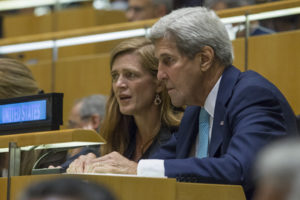
Secretary of State John Kerry with Samantha Power, U.S. ambassador to the U.N., during the general debate of the General Assembly, Sept. 20, 2016 (UN Photo)
Although the White House continued to cling to the myth of a “moderate” insurgency, it soon became obvious that the worst barbarians – bigoted Sunni fundamentalists, head-chopping “Takfiris,” even outright cannibals – were in control.
Warning flares went up but were ignored. In August 2012, the U.S. Defense Intelligence Agency reported that the Muslim Brotherhood, Al Qaeda and assorted Salafists were “the major forces driving the insurgency” and that their aim was to foment an anti-Shi‘ite sectarian war and establish a “Salafist principality in Eastern Syria,” the same area where Islamic State would establish its caliphate two years later. Yet the administration refused to adjust its strategy.
In October 2014, Vice President Joe Biden complained in a talk at Harvard that America’s Gulf allies “were so determined to take down Assad and essentially have a proxy Sunni-Shia war” that “they poured hundreds of millions of dollars and tens of thousands of tons of military weapons into anyone who would fight against Assad except the people who were being supplied were Al Nusra and Al Qaeda and the extremist elements of jihadis coming from other parts of the world.” (Quote starts at 53:25.)
Obama’s response was to order him to telephone various Gulf leaders and apologize for telling the truth.
Secretary of State John Kerry’s remarks to pro-rebel Syrian exiles last September were even more revealing. In the course of a 30-minute meeting at the United Nations, he volunteered that the U.S. goal was not to combat Islamic State as had been long claimed. Rather, it was to use ISIS (also known as ISIL and Daesh) to put pressure on Assad and force him to accede to a pro-U.S. government. Referring to Putin’s decision to intervene in Syria in November 2015, Kerry said:
“The reason Russia came in is because ISIL was getting stronger. Daesh was threatening the possibility of going to Damascus and so forth, and that’s why Russia came in, because they didn’t want a Daesh government and they supported Assad. And we know this was growing. We were watching. We saw that Daesh was growing in strength, and we thought Assad was threatened. We thought, however, we could probably manage [and] that Assad might then negotiate. Instead of negotiating, he got … Putin in to support him. So it’s truly complicated.” (Quote starts at 26:10.)
Using the Terrorists
The remarks, the subject of a misleading New York Times article by Anne Barnard and a smart analysis by longtime U.N. correspondent Joe Lauria, sums up all that was self-defeating about the Obama administration’s strategy. While the U.S. claimed to oppose ISIS, it was in fact happy to use it as a lever to pry Assad from power.
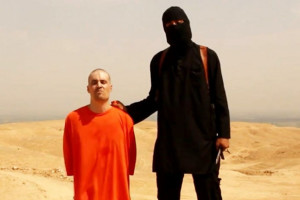
Journalist James Foley shortly before he was executed by an Islamic State operative
While the official line was that Russia only intervened to prop up Assad, Kerry freely admitted that the chief reason was to prevent ISIS from marching into Damascus. One could reasonably conclude from Kerry’s comments that Russia was more interested in combatting Islamic State than the U.S. was (although the opposite claim was often made by the Times and other mainstream news outlets).
Somehow Kerry had gotten it into his head that after pummeling Assad to the floor, ISIS would then politely step aside to allow pro-U.S. moderates to take over. The idea is every bit as delusional as George W. Bush’s belief in 2003 that he could romp into Iraq with 380,000 troops, smash things up a bit, and then go home, confident that a compliant pro-U.S. regime would maintain order in his absence. Rather than acceding to Kerry’s request, ISIS would no doubt have told him to get lost and taken power itself.
If so, the consequences would have caused even the most sang-froid realists to shudder in fear. “Were ISIS to have ensconced itself in Damascus,” observes Landis, “Lebanon would surely have fallen and Jordan would’ve been up against it.”
Saudi Arabia, already the sick man of the Middle East, would also have come under threat. Instead of a million refugees streaming toward Europe, there would have been five or ten times that number. Is this really what Obama wanted? It’s hard to believe, yet that’s precisely what his policies were leading to.
Although Obama predicted that Putin would find himself in a Vietnam-style “quagmire”, Putin was careful to limit the operation and avoid making promises he couldn’t keep. Even The New York Times was impressed by Putin’s calculated actions.
The climax came some 14 months later when Syrian government troops, backed by Russian airpower, finally drove Al Qaeda and its supporters out of their East Aleppo stronghold. Recognizing that the writing was on the wall, Turkey effectively switched sides, patching up relations with Moscow and engaging in joint bombing forays against rebel forces inside Syria. The Kurds, reliant on U.S. backing, were left dangling in the wind. So were the pseudo-moderates of the U.S.-backed Free Syrian Army.
Why Putin Won
This is why Putin came out on top: not because he’s a latter-day Svengali manipulating candidates and overturning elections, but because U.S. policy was leading to disaster and no one else was in a position to clean up the mess. In Kerry’s conversation at the U.N., the Secretary of State conceded that once Putin opted to intercede, there was little the Obama administration could do.
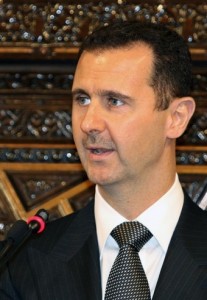
Syrian President Bashar al-Assad
“Instead of negotiating, he [Assad] got… Putin in to support him,” Kerry said in obvious frustration. After stumbling into Russia’s checkmate, the Obama administration could do little but fume from the sidelines.
At a White House press conference a few days after the Russian intervention, a reporter asked why the U.S. had allowed itself to be out-maneuvered. The response, which went on for a good five minutes or so, was pure Obama – charming, humorous, yet almost eerily detached. America is strong, he said: “…we’re the strongest advanced economy in the world… our approval ratings have gone up, we are more active on more international issues and forge international responses on everything from Ebola to countering ISIL.”
But Russia, he continued, is weak: “their economy’s contracting four percent this year. They are isolated in the world community subject to sanctions applied not just by us but by what used to be some of their closest trading partners. Their main allies in the Middle East were Libya and Syria … and those countries are falling apart. And he’s now just had to send in troops and aircraft in order to prop up this regime at the risk of alienating the entire Sunni world.”
In other words, Obama was saying that Russia is a loser; its friends are losers; and it was foolishly plunging into Syria in a last-ditch effort to bolster a loser who was clearly in his death throes. Obama thus ignored his own role in destroying Libya and Syria or provoking a confrontation over the eastern Ukraine. He refused to consider how his own policies were making matters worse and worse or why Putin felt he had no alternative but to step in after all.
Now the shoe is on the other foot. Russia is the dominant power in the Middle East at the moment – apart from Israel, that is – while the U.S. is in disarray as a dangerous rightwing buffoon ensconces himself in the White House. The Democrats should take a long hard look in the mirror if they want to know who the real loser is. But they won’t. They prefer to blame Putin and Russia.
The post America’s Putin Derangement Syndrome appeared first on crude-oil.top.
